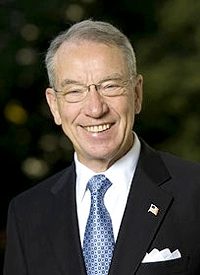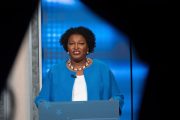
Sen. Charles Grassley (R-Iowa, left) issued a five-page letter Wednesday demanding that Food and Drug Administration (FDA) Commissioner Margaret Hamburg disclose who authorized an effort to monitor email correspondence of a group of whistleblower scientists. In the letter, Grassley warned that FDA officials could be usurping their authority by retaliating against whistleblowers who have expressed concern with the agency’s procedures.
The Senator’s request came in response to a story published Monday by the Washington Post, which revealed that the FDA secretly monitored all personal email communication of the agency’s own doctors and scientists after they notified congressional leaders that the FDA was approving medical equipment that “posed unacceptable risks to patients.” Six whistleblowers filed a lawsuit against the agency in U.S. District Court in Washington last week — after compiling a series of emails and memos obtained through the Freedom of Information Act — asserting that over the course of two years, their personal Gmail accounts were being recorded when they used them on government computers. Further, the Post reported:
Information garnered this way eventually contributed to the harassment or dismissal of all six of the FDA employees, the suit alleges. All had worked in an office responsible for reviewing devices for cancer screening and other purposes.
Copies of the e-mails show that, starting in January 2009, the FDA intercepted communications with congressional staffers and draft versions of whistleblower complaints complete with editing notes in the margins. The agency also took electronic snapshots of the computer desktops of the FDA employees and reviewed documents they saved on the hard drives of their government computers.
The plaintiffs allege that the government violated their constitutional privacy rights by tapping their personal email accounts. “Who would have thought that they would have the nerve to be monitoring my communications to Congress?” said Robert C. Smith, who reviewed devices at the FDA until his contract expired in July 2010. “How dare they?”
Grassley indicated that P.J. Hardy, a former FDA biomedical engineer and one of the plaintiffs, is one of nine FDA employees who wrote a letter to the incoming Obama administration in 2009, advising that managers at the Centers for Devices and Radiological Health, a branch of the FDA, ordered doctors and scientists to review medical devices with “unsound evaluation methods,” while intimidating and coercing FDA experts to “modify scientific evaluations, conclusions, and recommendations in violation of the laws, rules and regulation.”
Shortly after Hardy and his colleagues sent the letter, the FDA claimed Hardy may have engaged in criminal behavior. The Department of Health and Human Services Office of Inspector General (DHHS OIG) reviewed an FDA grievance alleging that Hardy leaked unauthorized information to the press and to Congress. In November 2011, the DHHS OIG concluded that Hardy did not engage in any criminal misconduct, but still, Grassley affirmed, “the FDA appears to have attempted to retaliate against P.J. Hardy for his protected disclosures to Congress.”
“I write to express my concerns over your agency’s treatment of whistleblowers as a result of their disclosures to Congress, and specifically disclosures to my office,” Grassley, ranking member on the Finance Committee, told Hamburg. “Whistleblowers… are often treated like skunks at a picnic.” He added:
It is troubling to me to see your Agency actively pursue the dismissal of an employee … not because they violated procedure and leaked genuinely confidential classified information, but simply because you “cannot trust him.” … During your confirmation hearing in the Senate in 2009 you stated, “I think whistleblowers serve a very important role in government in surfacing critical issues and concerns and making sure they’re addressed. As leader of the FDA, I would very much want to create a culture that enables all voices to be heard.”
In summing up the letter, Grassley demanded that Hamburg provide answers to the following questions:
- Who authorized the monitoring of all of the whistleblowers’ email accounts for communications with Congress?
- Are any of the original nine FDA physicians and scientists who wrote the letter to the Presidential Transition Team in 2009 still employed by the FDA?
- Did the FDA monitor all employee email accounts, including personal accounts, or was the monitoring target only at the nine whistleblowers?
- Did the FDA obtain the passwords to the employees’ personal email accounts, which would allow emails to be intercepted even when not sent or received from a government computer?
- Is the FDA currently monitoring any employee email accounts?
- What steps have you taken to reassure employees that they have a right to have direct communications with Congress?
- Does the FDA have any procedures to ensure that Congressional correspondence remains confidential?
Sen. Grassley, who is a longtime defender of whistleblowers’ protection rights, has been investigating the FDA for years as controversies over drug safety and medical devices have overrun the agency. One of the Senator’s aides conceded that the government does have the authority to monitor activity on government computers, but added that the means by which these employees were being monitored are ethically questionable.
“The FDA went far beyond ‘routine monitoring.’ They unconstitutionally targeted one group of employees simply because they had the guts to speak up about misconduct,” argued Stephen Kohn, executive director for the National Whistleblowers Center and lead counsel in the lawsuit. “The FDA cannot use unconstitutional tactics to enforce an otherwise neutral employee surveillance policy.”



